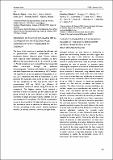Por favor, use este identificador para citar o enlazar a este item:
http://hdl.handle.net/10261/274814COMPARTIR / EXPORTAR:
 SHARE
BASE SHARE
BASE
|
|
| Visualizar otros formatos: MARC | Dublin Core | RDF | ORE | MODS | METS | DIDL | DATACITE | |

| Título: | The role of parasites in the invasion success of the exotic brine shrimp Artemia Franciscana in the Meditarranean region |
Autor: | Sánchez, Marta I. CSIC ORCID CVN ; Georgiev, Boyko B.; Nikolov, Pavel N.; Vasileva, Gergana G.; Lenormand, Thomas; Rode, Nicolas O.; Flaven, E.; Varo, Nico CSIC; Amat, Juan A. CSIC ORCID; Matesanz, Cristina; Díaz-Real, Javier; Green, Andy J. CSIC ORCID | Fecha de publicación: | jun-2011 | Citación: | Symposium for European Freshwater Science (2011) | Resumen: | Biological invasions are main threats to biodiversity at global scale and increasing numbers of studies suggest that parasites may have a role. However, the mechanism through which parasites may influence the outcome of the invasion is poorly understood. Here we provide evidence supporting the role of parasites as potential agents mediating the competitive exclusion of Mediterranean brine shrimps Artemia (A. parthenogenetica and A. salina) by the exotic American A. franciscana, using different native and invasive populations from South Spain and South France. Our results revealed high rates of infection by cestodes in native brine shrimps, sometimes with extreme prevalences of up to 100%. In contrast, A. franciscana populations showed very low diversity, prevalence and burden of cestodes. The effect of parasites in native populations was multiple, ranging from reproduction and survival, to life history traits, microhabitat selection and diet. Infection strongly reduced host fitness by both, reducing fecundity (parasite castration) and indirectly increasing predation by birds final hosts as revealed by prey choice experiments. We found evidence that high rate of parasitism (particularly the castrating parasite Flamingolepis liguloides, the most prevalent cestode in natives but nearly absent in the exotic Artemia), indirectly affected the life-history strategy of non infected individuals, inducing for example earlier maturation. Moreover cestodes influenced spatial (vertical and horizontal) distribution of the host, altering the diet as revealed by isotopic analysis. Contrasting with the strong impact of parasites in native populations, we have never observed any pathology (castration, behavioural alteration, etc) associated with infection in the exotic species. Overall, the results of this study suggest that the large impact of cestode on the native, but not the invading species, is likely to confer a decisive competitive advantage to the invader, contributing to explain the demographic success of A. franciscana in the Mediterranean region. | Descripción: | Trabajo presentado en el Symposium for European Freshwater Science, celebardo en Girona del 27 de junio al 1 de julio de 2011. | URI: | http://hdl.handle.net/10261/274814 |
| Aparece en las colecciones: | (EBD) Comunicaciones congresos |
Ficheros en este ítem:
| Fichero | Descripción | Tamaño | Formato | |
|---|---|---|---|---|
| Sanchez_et_al_SEFS7_Girona.pdf | 66,14 kB | Adobe PDF |  Visualizar/Abrir |
CORE Recommender
NOTA: Los ítems de Digital.CSIC están protegidos por copyright, con todos los derechos reservados, a menos que se indique lo contrario.
